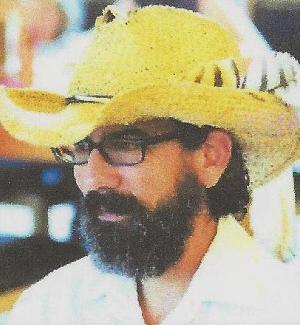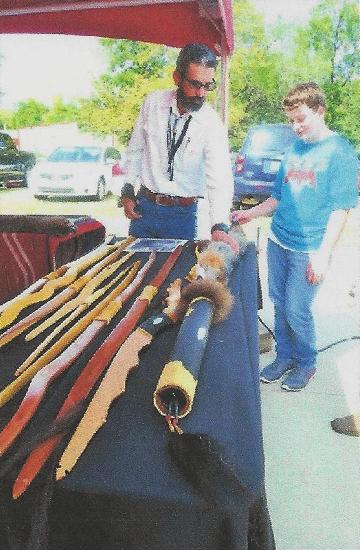 |
Canku Ota
|
 |
|
(Many Paths)
|
||
|
An Online Newsletter
Celebrating Native America
|
||
|
February 2016 - Volume
14 Number 2
|
||
|
|
||
|
Chickasaw Bowyer,
Artist Maintains Traditional Life
|
||
|
by Gene Lehmann, Media
Relations, Chickasaw Times
|
||
|
'A foot in both worlds'
MEERS, OK – Meers' claim to fame – aside from an "if-you-blinked-you-missed-it" gold rush in 1901 – is a mammoth hamburger made from the lean beef of Texas Longhorns. On the outskirts of this tiny unincorporated western Oklahoma
community lives Chickasaw citizen Elihu Johnson, his wife, April
and six young daughters. On a 30-acre patch of ground, Mr. Johnson
makes a living performing odd jobs and selling Native American art,
specifically wildlife pencil drawings, and elaborate bows, arrows,
fur quivers, knives He stalks white-tailed deer and elk on 800 acres of unforgiving, harsh mountain terrain. Panoramic sunsets blaze a sky along the Wichita Mountains, a rocky, inhospitable escarpment divorced of comforts, yet teeming with wildlife. Mr. Johnson felled a 10-point buck deer with a muzzleloader in October and his quest for elk began in December. Successful kills assuage the family's primary need as winter grinds slowly southward. Their life is a tad above subsistence thanks to his artistic lilt of capturing a likeness of creatures and crafting traditional Chickasaw weaponry. For two years now, doors of opportunity have opened wide. He earned the title of "Fellow" at the Southwest Association of Indian Arts (SWAIA) – one of America's top Native art shows hosted annually in Santa Fe, NM With the title came a $5,000 grant and the opportunity to showcase his talent to wealthy collectors and aficionados of Native art. He is Chickasaw and Kiowa, a man of few words, quiet and reserved. All traits, he said, he inherited from his Chickasaw grandfather. "I keep a foot in both worlds," Mr. Johnson said. "I have found
a place with the Chickasaw and the Kiowa, a place in the modern
world and in the primitive world."
An appreciation of this man's ability to forge weapons into
works of art is to embrace the unconventional. Some of "I was told a bow with a hole in it, or a bow that isn't completely straight, is structurally compromised," Mr. Johnson said. "I've used all these bows and they performed wonderfully. "As long as the two ends form a straight plane, the bow will be true and strong. For the first 30 years of his life, the artist identified as
Kiowa. The Kiowa were a nomadic tribe that roamed freely from Montana
into Colorado and Kansas, hunting bison along the vast prairies
of the High Plains. They acquired He registered as a Chickasaw citizen recalling his grandfather's
story about the tribe, how it was feared and respected by friend
and foe and how contact with Europeans occurred centuries before
settlers moved west, forcing "My heritage awakens emotions within me," Mr. Johnson said.
"When I touch that wood, I go back in time. I'm a hunter and a warrior.
I protect and provide for my family. If it wasn't for (Chickasaws),
we'd all be speaking Spanish Typically, a Johnson bow commands hundreds of dollars, more if the work was particularly tedious, difficult or ornate. He struggles with "prices." "If I didn't have to feed my family, I'd give them away," he
said. "I believe my clients and festival participants know they
are buying an item that is one-of-a-kind. No two are exactly alike.
They are priceless to me. I love all aspects In November, the onslaught of winter was held at bay by El Nino, but Mr. Johnson expects bitter cold in months ahead. He grew a gray-flecked beard. The deer he harvested isn't enough. "A deer isn't going to feed my family through winter," he said. "I need an elk." The deer he harvested yielded 75 to 100 pounds of venison. "That will only feed my crew for a couple of months," he said. "An elk will see us through to spring." He has begun chopping wood to fuel a wood-burning stove and fireplace in his crowded cobblestone domicile. While the family enjoys electricity and running water, Mr. Johnson would be just as comfortable in a small cabin with coal lanterns illuminating its interior. He is not alone in begrudging these small comforts. Mr. Johnson
said the love of his life shares his affinity for the simple, hardy
life. "If it was up to my wife, we'd live in a tepee." |
||||
|
|
|
|
||
|
|
||
| Canku Ota is a free Newsletter celebrating Native America, its traditions and accomplishments . We do not provide subscriber or visitor names to anyone. Some articles presented in Canku Ota may contain copyright material. We have received appropriate permissions for republishing any articles. Material appearing here is distributed without profit or monetary gain to those who have expressed an interest. This is in accordance with Title 17 U.S.C. Section 107. | ||
|
Canku Ota is a copyright ©
2000 - 2016 of Vicki Williams Barry and Paul Barry.
|
||
 |
 |
|
|
The "Canku
Ota - A Newsletter Celebrating Native America" web site and
its design is the
|
||
|
Copyright ©
1999 - 2016 of Paul C. Barry.
|
||
|
All Rights Reserved.
|
||

